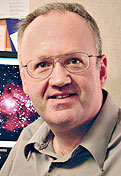 |
|
|
 |
2005
May
27
|
One stylus, two styli, no stylii
The needle of a phonograph is more formally known as the stylus.
While trying to procure one of them, I've learned that the web-literate
audiophile community does not have a very firm grip on this word.
One major vendor of styli seems to think styli is the singular.
("This is a styli for a Pickering V-15...")
Another thinks the plural is stylii, a misspelling
that must occur 1000 times on his copious web site.
I don't want to name either of these vendors because I may be about to
do business with them - they look like good outfits despite lack of Latinity - but
I challenge you to find them with Google and maybe even break the bad
news to them.
Incidentally, whenever you see a plural or a genitive (Latin possessive)
that ends in -ii, it's because the base form ended in -ius.
The first i isn't part of the suffix at all.
And even more incidentally, the word virus has no Latin plural.
Not viri and certainly not virii.
Its last two letters are not the usual -us suffix;
their origin is obscure.

|
 |
2005
May
26
|
Spiral galaxy
 This picture shouldn't have shown anything at all, but here it is.
At the top you see the spiral galaxy M51 and its satellite galaxy, to
which it is connected.
Near the bottom, another fuzzy spot is an 11th-magnitude galaxy.
This picture shouldn't have shown anything at all, but here it is.
At the top you see the spiral galaxy M51 and its satellite galaxy, to
which it is connected.
Near the bottom, another fuzzy spot is an 11th-magnitude galaxy.
I took this last night under rather poor conditions - the sky wasn't very dark or clear -
using my Digital Rebel and an old 135-mm Pentax lens at f/4. I stacked four 5-minute
exposures and subtracted a stack of 3 dark frames.
The ability of the digital camera to subtract out skyglow is almost magical.
What happened is that a photographer from the
Athens Banner-Herald
came over to take a picture of me with my telescope.
I had it set up for astrophotography, so after he left I decided to attempt a picture.
I didn't even make guiding corrections, although the PEC was programmed and the drive
ran very smoothly.
What you see is the small central portion of a much larger picture.
I had the dim idea that Comet Machholz, which is still hanging around in the northern
sky, would be in the picture too.
Unfortunately, it was just a bit too far away.

|
 |
2005
May
25
|
A series of unfortunate events
No, I'm not talking about
Lemony Snicket.
 Over the weekend, while making backups, I apparently had some kind of accident, or fell victim to an
unrecognized software bug, and deleted my entire collection of astrophotography computer files
(logbooks and digital images) without knowing it.
Over the weekend, while making backups, I apparently had some kind of accident, or fell victim to an
unrecognized software bug, and deleted my entire collection of astrophotography computer files
(logbooks and digital images) without knowing it.
Naturally, this happened just before the backup.
Fortunately, I only lost my work from 2004, and 2004 was a slow year.
Most if not all of 2005 was still on my laptop and I just copied it into place again.
Up to 2003 I had CD-ROM backups.
From 2004, I still have printed logbook pages including lots of pictures, so I haven't
lost any knowledge of which techniques worked and which didn't.
Also, fortunately, the images from this Notebook survive, and almost all of 2004's work was
planetary imaging where the images in this Notebook are actually full resolution,
rather than downsampled.
The only real loss was the full-resolution version of the lunar eclipse picture that you see here
(from October 2004).
All of this was definitely bothersome. From now on I back up twice as often!
The cult of Ana: The Internet has enabled anorexic girls to band together and
form their own
pagan cult.
I am dismayed.
A sad aspect of Internet culture is that it enables bad ideas to spread very fast
among young people without becoming visible to parents or the rest of society.
At least when young people were being brainwashed by TV and movies, their parents
could see what was brainwashing them, if they cared to.
I actually saw some mention of Ana on an episode of Law and Order but thought it
was fictitious.
Not to be outdone by the regulators, I wrote a
computer program
to place the University's disclaimer on web pages automatically.
I will also be marking more of the pages in this Notebook to make it abundantly
obvious that they are not hosted by the University.

|
 |
2005
May
23-24
|
The disclaimer question
Last night the University of Georgia surprised all its computer users by
announcing a
new policy
that requires the following disclaimer on all web pages except official ones:
The content and opinions expressed on this Web page do not necessarily reflect the views of nor are
they endorsed by the University of Georgia or the University System of Georgia.
This policy didn't come from the usual computer ethics and security people,
and I think it is unduly burdensome.
Disclaimers should not be necessary on personal web pages that are clearly recognizable as such.
The whole Web community already knows what a personal web page is.
I am pressing for the policy to be amended.
Very few people actually create web pages in bad faith - intending for them to be mistaken
for official ones - and the rest of us (32,000 students and 5,000 employees or more)
shouldn't have to type disclaimers on every web page just because of a few bad eggs.

|
 |
2005
May
22
|
Putting old records and tapes onto new CDs
I spent a good bit of time gadgeteering today.
I found a good Sony DVD+-RW drive at the local Wal-Mart last night
for $40 after rebate (!),
and it's now installed in Minerva, my main desktop.
Meanwhile I used Artemis, Melody's desktop, to capture audio from some
old cassette tapes in order to create CDs.
This is something we've done sporadically over the years.
It's often amazing how much better the CD sounds once it's been through
some intelligent signal processing.
Here's how we do it.
(1) Connect the computer to the stereo.
The easiest way to do this is to treat the computer as a tape deck.
Tape Play on the stereo goes to Headphone on the sound card,
and Tape Record goes to Line In on the sound card.
This requires 2 of the cables that come with every sound card
(except that only one of them comes with every sound card,
and you probably want longer ones anyhow).
(2) Record and process the audio files with
GoldWave.
This handy shareware package - with a generous free trial period - not only
records sound, it also filters it to eliminate pops, crackles, and tape hiss,
as well as providing a full range of editing functions,
including the ability to
chop up one file into many songs automatically by finding the silent intervals
between them.
(3) Select a group of the resulting .WAV files, right-click on "Add to Burn List,"
and let Media Player make them into an audio CD.
Today I was doing something harder - trying to retrieve a couple of record albums
of which I only have low-quality monophonic cassette recordings made over 30 years ago.
The results did sound better than the original tapes, but you can't spin
lead into gold, and I quickly found that the original albums were both available
on eBay, so I'll probably buy them and transcribe to CD from vinyl.
A subsequent project will be to get a 78 rpm needle for my Pickering cartridge,
then transcribe my father's records, which he bought from a jukebox owner
around 1950.
We have some interesting items!

|
 |
2005
May
21
|
"Only a Sith thinks in absolutes"???
I haven't seen the latest Star Wars movie.
One Star Wars movie, in 1977, was very refreshing.
A couple more were welcome.
But I don't need six.
What's worse, there are indications that, in the latest movie,
George Lucas
sacrificed
plot consistency in order to
take a potshot at President Bush
or at conservative values in general.
Apparently, if you "think in absolutes" you are not a proper postmodernist liberal.
People who make bumper stickers have certainly latched onto the quotation.
Click
here
to Google for
"Only a Sith thinks in absolutes" and see what it has led to.
I'm not sure what they mean by "thinks in absolutes."
Is Mr. Lucas advocating subjectivism or just subtlety?
Paradoxically, believing in absolute truth is the only reason to be tolerant.
If there is objective truth, then there's a chance you're objectively wrong,
so you should tolerate those who disagree with you.
If there is no objective truth, all debates are just power struggles,
and there's no reason not to stomp on anybody who gets in your way.

|
 |
2005
May
19-20
|
A busy day in the blogosphere
Hang on to your hats - I have a lot to write about today.
Let's begin with my latest evening with a 5-inch telescope
(May 18).
The pictures below were taken with my vintage Celestron 5
(25 years old this year) and a Philips ToUCam Pro (640×480 pixels).
The Jupiter image used a ×3 Barlow lens; the moon images did not.
Each was recorded as about 1000 frames of video, then the best 600 to 800
frames were selected, stacked, and enhanced with
Registax 3.



Not bad for a telescope the size and shape of a coffee can!
The last of these is better than the best film photographs ever taken of Jupiter
with telescopes of any size (even the large observatories).
In an astronomy textbook of, say, the 1970s, you would not see a picture of
Jupiter that good.
Human cloning is here
In defiance of a United Nations ban, the University of Newcastle has
cloned human embryos.
They plan to break them up to harvest the stem cells.
Human cloning is here.
I'm against it for all the usual reasons.
Principally, I'm against breaking up or discarding human embryos.
As Dr. Seuss put it, "A person is a person no matter how small."
But there is a second issue we need to raise immediately:
full civil rights for people who are conceived by cloning.
I'm afraid too many people already have the preconception, based
on science fiction, that human clones won't be "real" people, and
that it will be OK to enslave them.
Balderdash! Let's get on this one immediately.
Economic news
Our economy is shifting gears, but it's hard to tell what gear it's shifting into, so I've been
reading up on economic matters. I should emphasize that I'm not an economist.
Item 1: I'm not the only person who has noticed the
dubious practices of the credit card industry.
There has been a
Senate banking committee hearing,
and
here's some of the testimony.
The point? Suppose a lender said:
The interest rate on this loan is 6%.
But if you are even one day late with a payment,
or if you are late with a payment to some other creditor,
or anything else happens to lower your credit score,
we will either raise your interest rate to 29% or else demand that
you pay off the loan immediately.
That's a ruthless loan shark, right?
No, it's a normal early-21st-century American credit card making a promotional offer.
I'm tracking this issue; you'll hear more about it. We need a national usury law.
But there's a bright side. According to an anonymous Congressman that I saw quoted somewhere,
all this competition has put the Mafia out of the moneylending business.
Item 2: Inflation may be coming back.
There have been very conflicting indicators, but I prognosticate an inflation
rate of about 5% for FY06, up from about 2.5% now.
[Note added August 17: No, I don't.]
While rooting around for some insights about this, I came across the very useful
web site of the Federal Reserve System
and learned that they help to publish a scholarly journal
(using LaTeX, hurrah!).
And in it is
this article about monetary policy neglect.
The article's point is that a government should always control the money supply by making
interest rates track inflation.
(This is how you make your money keep its value.)
If you try to keep interest rates too low, you let inflation run wild.
And if you pretend that inflation is caused by something other than the money supply - as Australia and
New Zealand did for a long time - you lose control of it.
Back during the Great Inflation (1967-79) in the United States, people and even governments seemed to think
inflation was caused by:
- Retailers raising prices;
- People wanting too many goods and services;
- The minimum wage being too high; or
- The Arab oil embargo.
The monetarist position, as I understand it, is that all of these things can contribute to inflation,
but if the money supply isn't controlled, they contribute far too much; the economy doesn't absorb the stress,
and prices rise wildly.
To take the first example,
controlling the money supply will put a limit on retailers raising prices, because if they raise prices too
high, they won't sell much.
Allowing the money supply to expand doesn't actually leave people better off, even if it's well-intentioned.
(Inflation combined with low interest rates
does leave the housing industry better off,
because of its dependence on long-term borrowing,
and one of our hot political issues around
1978 was whether to run the economy for the benefit of housing or for the benefit of everyone else.)
And finally...
I grew up in south Georgia, and my mother's family is from southwest Georgia,
land of the
gopher tortoises.
These increasingly rare reptiles have finally made it onto CNN.
They are closely related to the desert tortoise of the American West
(also rare) and the giant tortoises of the Galapagos Islands.
They really are disappearing. I last saw one in the wild, crossing a road, in about 1987.
And now the word is that they are being wiped out by the invasion of armadillos from Texas.
I knew those armadillos were up to no good!
There have been minor editing changes in several recent entries to improve accuracy
and readability.
They are in
brown type.

|
 |
2005
May
18
|
What is a wedding for?
The latest obnoxious custom to break out in modern society
is the practice of
charging
your friends money to attend your wedding.
This practice is, as Sharon tells me, "already in etiquette Hell," but some people
don't have any sense. The faux pas of a few rich fools
can all too easily trickle down to become
a fad among the less knowledgeable.
When the concept of marriage goes askew, it can't be long
before the wedding also turns into something goofy.
For some people, it's apparently nothing but a big party.
They've lost all awareness that it's actually something else.
Another factor is the 20th-century custom of pretending, at your wedding, to belong
to a considerably higher socioeconomic class than you really do.
Partly, this pretense comes from a praiseworthy ideal - you want to honor your marriage
by celebrating it in as dignified a way as possible.
That means imitating rich people, who have the best of everything at their disposal
and (we hope) can be trusted to do things in style.
(Maybe.)
But partly, it just turns into a game of pretending to be rich,
and trying to impress people with how much money you can spend.
When Melody and I got married, making people think we were rich was not
on our list of goals.
Nor was giving them the party of their lifetime.
Our goal was to celebrate Christian marriage.
It was 1982, and people were asking us, "Are you going to get married or just live together?"
Definitely the former!
This implies that we wanted a church wedding in front of our families and a reasonable
number of friends,
with a very traditional ceremony.
Melody took the lead in controlling costs, and she did an impressive job.
We kept things dignified but simple.
It helped a lot that the rehearsal dinner and reception were in a Baptist
church hall, with no alcoholic beverages.
Anyhow, our families just aren't drinking people.
Nor did we have dancing and a band or DJ.
Probably not 1% of the guests knew how to dance.
Certainly not Melody or me!
And as you can see, we came out quite successfully married.
Now then... What are we to make of the young upstarts who want to charge their
guests money?
Or the slightly more established custom of demanding that the guests fly to Hawaii
or some other vacation spot for a "destination wedding"?
The goal is obviously not to appear rich.
The goal seems to be marketing the wedding as an entertainment package.
Folks, we didn't have our wedding primarily in order to entertain people.
We had it in order to get married!

|
 |
2005
May
17
|
Copernicus and Eratosthenes

This image of the lunar craters Copernicus and Eratosthenes was captured
the same way as my recent pictures of Jupiter, but when I processed the video,
I got better results by selecting the one best frame than by trying to
stack the best 59 frames. The reason, I think, is that this picture covers a much
larger patch of sky than the face of Jupiter, and the whole picture doesn't move
in unison when there's atmospheric turbulence.
Note the two ghost craters above center - the remains of ancient craters,
visible now only as rings of small irregularities.
Actually, I'll let you be the judge.
I worked over the video file again, this time stacking the best 278 frames.
(Maybe 59 weren't enough.) Here's the result, after a considerable amount of
sharpening of course:

Maybe it is better.

|
 |
2005
May
16
|
Butterflies...
Today I got equipped for learning to program Atmel AVR microcontrollers.
(That's my summer "sideline" project - it has nothing to do with my funded research,
but it's too interesting to miss.)
Three Butterfly
microcomputers and two STK500 development kits arrived at my office.
I'll keep you posted as I dig in.
What does the Pope think about economic systems?
Read his remarks
here
(delivered when he was a cardinal).
Rather intelligent reasoning, I think.
Key point: No economic system is so good that once you've implemented it,
you no longer have to think about whether it's really helping or hurting people.
Apologies to those of you with narrow screens who couldn't see the whole width
of this notebook at once.
The culprit was the long line beginning "HKEY_CURRENT_USER..."
in the entry about "Open With..." a few days ago.
I've broken it up.
I aim to keep this web site readable on 600×800 screens,
but I don't always test it with a browser that narrow.

|
 |
2005
May
15
|
If you're against euthanasia of humans, you should also be
against this loophole,
"terminal sedation," which in some cases means keeping people unconscious until they starve to death.
I think human euthanasia is inherently wrong.
But even if it weren't, I'd still be against it because of another issue:
old people, especially those without families to stand up for them,
will face pressure to accept euthanasia to keep from being a burden.
This is allegedly already happening in the Netherlands.
Since the pressure is economic in nature, there doesn't seem to be any way to eliminate it.
Things I didn't know until I surfed the Web a lot:
You can
check on the
financial condition of your bank, any bank in the country.
Most have three or four stars.
Here is a psychiatric
examination of Gollum (Smeagol) in The Lord of the Rings.
It's from the British Medical Journal's annual
Christmas issue, which
traditionally covers topics that range from odd to funny.

|
 |
2005
May
14
|
Aurora borealis?
Spaceweather reports that there may be a
fine display of the Northern Lights (Aurora Borealis) in the next day or so.
Check the activity level
here.
If part of the auroral oval goes bright red and comes within 500 miles of you,
and it's nighttime and you're out in the country,
go out and look at the sky.

|
 |
2005
May
13
|
"Open With..." the wrong thing
What better day than Friday the 13th to analyze something that went wrong?
As you know, Windows uses the file name extension (such as .txt on a text file,
or .bmp on a bitmap graphic) to decide how to open the file when you click on it.
This information is stored in two places in the Registry:
- HKEY_CLASSES_ROOT
for the settings that apply to all users.
These are created when you install software that recognizes the files.
If different software packages disagree, the most recently installed one wins.
- HKEY_CURRENT_USER\Software\Microsoft\Windows\
CurrentVersion\Explorer\FileExts
for choices made by the individual user, by right-clicking on the file and choosing
"Open With...". These override the settings in HKEY_CLASSES_ROOT.
Also, all the choices that have ever been made are remembered as
"recommended programs" even if they're dead wrong.
Well... I got a call yesterday that a hapless user of
TIP had
set his computer to open TIP files with Acrobat Reader.
TIP has nothing to do with Acrobat Reader.
When Acrobat Reader gets hold of a TIP file, all it can do is complain that it can't read it.
To straighten out the mess, I wrote a small VBSCRIPT program.
You can download it, zipped,
here.
More likely, though, you'll want to make a similar program customized for your own needs,
so here it is:
' VBScript to delete any user-specified "Open With" options for TIP files
MsgBox "This script will delete any user-specified 'Open With' options for TIP files." + vbCRLF + _
"TIP files will then open as specified by TIP itself.",0,""
On Error Resume Next
Dim WshShell
Set WshShell = WScript.CreateObject("WScript.Shell")
WshShell.RegDelete "HKCU\Software\Microsoft\Windows\CurrentVersion\Explorer\FileExts\.tip-d\OpenWithProgids\"
WshShell.RegDelete "HKCU\Software\Microsoft\Windows\CurrentVersion\Explorer\FileExts\.tip-d\OpenWithList\"
WshShell.RegDelete "HKCU\Software\Microsoft\Windows\CurrentVersion\Explorer\FileExts\.tip-d\"
WshShell.RegDelete "HKCU\Software\Microsoft\Windows\CurrentVersion\Explorer\FileExts\.tip-v\OpenWithProgids\"
WshShell.RegDelete "HKCU\Software\Microsoft\Windows\CurrentVersion\Explorer\FileExts\.tip-v\OpenWithList\"
WshShell.RegDelete "HKCU\Software\Microsoft\Windows\CurrentVersion\Explorer\FileExts\.tip-v\"
MsgBox "All done.",0,""
|
Store this on a file whose name ends in .vbs, click on it to run it, and you're done.
Note that your security software, if any, will probably object to running it until you
give permission.

|
 |
2005
May
12
|
Miscellany

This young male Anolis carolinensis (American chameleon) is hanging around my back
yard this year. He may well be the son of the female that I photographed several times last
year. If so, he's more than a year old, not one of this year's babies.
(Don't panic. This is a close-up. His head is about half an inch long.)
I realize I'm looking at it superficially, but today's logic award
goes to the Michael Jackson defense, whose strategy seems to be to
identify boys that Mr. Jackson did not molest.
If he were accused of bank robbery, would they be identifying banks he
definitely did not rob?
I have no idea whether he's innocent or guilty, but the logic of this
defense tactic amused me. To put it bluntly:

as any logician worth his salt can tell you.
Obviously, Jackson's lawyers aren't minding their
 's and 's and  's. 's.

|
 |
2005
May
10-11
|
Kilofarads!
There are two ways to store electricity: in a battery or in a capacitor.
Batteries store electricity by undergoing chemical changes.
That means there are real limits to how fast they can be charged and discharged.
Capacitors store electrons by attracting them to positively charged surfaces,
so they can charge and discharge almost instantly.
The unit of capacitance is the farad, which is enough electricity to
deliver 1 amp for 1 second, assuming constant voltage.
In real life the voltage declines as the capacitor discharges, but the
approximation I just gave is good for the first small fraction of the
discharge curve. I thank George Ott for requesting this clarification.
Ordinary capacitors are very tiny (in capacity, that is). Most of the capacitors
in a radio or computer are about 0.1 microfarad (0.0000001 farad).
In my youth, the biggest ones we ever saw were about 300 microfarads (0.0003 farad),
and they were the size of small tomato-juice cans.
The joke was that a 1-farad capacitor couldn't exist, and if it did,
it would be the size of a railroad car.
Not any more.
To make a capacitor hold more electrons, you need multiple layers that are very
thin and very close together, so the positive and negative charges will attract
each other without actually touching.
Manufacturers now use electrolytic processes to make extremely thin
layers with very crinkly surfaces so that a lot of surface area can be packed into
a small space.
So we now have thimble-sized 1-farad capacitors.
In fact, I need to install one in my digitally tuned shortwave radio
(vintage 1987) so it won't lose its settings when the clock battery is
being replaced.
But that's not all.
There are now kilofarad-sized banks of capacitors used for
regenerative braking in electric vehicles.
Regenerative braking means you use the motor as a generator, so that
when you put on brakes, the vehicle slows down and the electric energy
is recaptured.
Unlike a battery, a capacitor can charge extremely fast, so the generator
can put a very heavy mechanical load on the vehicle and capture a lot of
energy fast.
What's next? Megafarads?

|
 |
2005
May
9
|
And again...


This may be my best Jupiter picture yet; Satellite II (Europa) is about to pass in front
of the planet. Same technique as last night, but somewhat better conditions.
The second picture is the double star Alpha Herculis, as blurred by the atmosphere and by
diffraction in the telescope.
You can see the color contrast - the brighter star is yellower.
University of Michigan alumni are proud of the large number of double stars that show
their school colors (yellow and blue).
The astrophysics behind it is that the larger star develops faster, so it starts to
reach the red giant stage while the smaller star is still young and bluish-white.
I like to point out that a bit later on in their development,
when the larger star has completely burned out,
these stars will show the University of Georgia
colors (black and red). We just don't see the black ones!

|
 |
2005
May
8
|
Jupiter again

Last night I got the telescope out and added an extension tube (made from kitchen sink trap hardware)
behind the Barlow lens to get greater magnification.
This is the kind of Jupiter picture I'm getting with this technique.
Not bad, is it?

|
 |
2005
May
7
|
What to read when you're not reading this notebook
Here are some interesting links I've collected recently...
Bad
money management award:
Go to Las Vegas with boyfriend, lose $40,000 (charged to your credit card),
never make it clear whether the two of you were sharing the debt,
and then break up.
Yes, it's been done!
Comic-strip
biography of Charles Darwin, a bit unfair I think, since although Darwin did study divinity
(as did many indecisive students of the time), he was not a professional church worker, nor did he
intend to undermine Christianity with his theory of evolution.
I wish right-wing Christians would stop seeing all evolutionary science as anti-Christian.
Surely we have a right to study everything God created and see where it leads...?
Equally annoying, though, are those who take a bit of evolutionary science and spin it into
a completely godless explanation for everything, as if a few dinosaur bones somehow disposed of the need
to think deeply about the origin of the universe,
or consider the possibility that
it didn't evolve by itself.
You get on very dangerous ground when you assume that anything radically different from your
current theories can't be true because "it's not the Scientific Method."
Scientific progress has been snagged on that many times in its past.
In Copernicus' time, non-earth-centered orbits were "not the Scientific Method."
The star Delta Scorpii is not as bright this year as last year.
By brightening about 5 years ago, this star noticeably changed the appearance
of the constellation Scorpius.
Light curve
here,
with lots of noise because it's hard to measure such a bright star accurately;
story (not up to date)
here.
Least surprising news story of the month:
Cannabis (marijuana)
increases
your risk of a car crash.
Who would ever have guessed?
Finally,
the psychiatry of
people who
complain and are never satisfied - the kind of people who spend their lives in lawsuits.
(Non-subscribers can only read the abstract on this site, but that's enough.)
The key idea is that
pathological complainers want vindication and retribution
whereas reasonable ones
want reparation and compensation, which the legal system is designed to deliver.
That is: The unreasonable complainer wants to convince everyone that he's right,
to bring heavy punishment upon his opponent, and to make opposition to his cause disappear.
The reasonable complainer merely wants compensation or reversal of perceived harm,
while admitting that not everyone will agree ("there are two sides to every issue").
This reminds me of a kind of political activist, the kind who wants to completely
obliterate the opposing side, either by force or by creating a climate of opinion in
which the other side has no voice.
I'm not that kind.
I'm the kind who wants errors to be discussed and refuted rationally, not silenced.

|
 |
2005
May
3-4
|
A triumph over Alzheimer's Disease?
The BBC reports
an unusual case in which a woman with early-onset
Alzheimer's Disease regained the ability to speak, read, and write
after going through a basic English course.
This suggests a general tactic:
if you lose some knowledge due to brain damage,
you can learn it again into undamaged areas of the brain.
It's like dealing with a damaged hard disk by formatting out the bad sectors.
This is just speculation and is outside my research specialty.
But it suggests the reason for the well-known fact that
intellectually active people are resistant to Alzheimer's:
They are constantly relearning their knowledge.
At least, I know I am, and I suppose other people with active minds are like this.
I shift my attention between various interests, and I rather enjoy
reviewing basic things every time I return to something I've been away from.
Or even when I haven't.
I do not object to rereading books I've read before,
and I enjoy introductory textbooks because I want to see how
someone else puts the basics together.
That's also why I enjoy writing explicit introductions to subjects.
At the other end of the spectrum, back when PCs were new,
those of us who did computer support
often encountered middle-aged office workers
who were intellectually dead - who were dead-set against learning anything new,
and had been that way for years.
They were extremely resistant to computers, not because computers were hard,
but because they were hard-headed.
Are these the high-risk group for Alzheimer's?
If you like interesting characters, go and look at
Ambra Nykol's blog
for May 1, then browse around on her site.
Definitely a voice, not an echo!

|
 |
2005
May
1-2
|
Jupiter and satellite


Here's the result of last night's (May 1) astronomy session.
In the first picture, Jupiter's Satellite II (Europa)
is in front of the planet (in the position marked by the arrowheads)
and its shadow is the big black spot.
In the second picture, 77 minutes later, the satellite has moved off
to the left, and (as you can see) Jupiter has rotated quite a bit.
These were taken with an 8-inch telescope and Philips ToUCam under
mediocre conditions; the best video frames were selected and
processed with Registax.
The slight twist between one picture and the other is due to
not having the camera in the same position.
Happy Orthodox Easter! Eastern Orthodox Christians use a different algorithm
for determining the date of Easter than Roman Catholics and Protestants,
and theirs is May 1 this year.
The date of Easter moves, of course, because Christians attempted to preserve a small part of the
Jewish lunar calendar, for this holiday only -
and for centuries they did it without the Jews and didn't get it quite right.
This year Western Easter, Orthodox Easter, and the real
Passover fall on seemingly unconnected dates.

|
 |


![]()
 This picture shouldn't have shown anything at all, but here it is.
At the top you see the spiral galaxy M51 and its satellite galaxy, to
which it is connected.
Near the bottom, another fuzzy spot is an 11th-magnitude galaxy.
This picture shouldn't have shown anything at all, but here it is.
At the top you see the spiral galaxy M51 and its satellite galaxy, to
which it is connected.
Near the bottom, another fuzzy spot is an 11th-magnitude galaxy.
 Over the weekend, while making backups, I apparently had some kind of accident, or fell victim to an
unrecognized software bug, and deleted my entire collection of astrophotography computer files
(logbooks and digital images) without knowing it.
Over the weekend, while making backups, I apparently had some kind of accident, or fell victim to an
unrecognized software bug, and deleted my entire collection of astrophotography computer files
(logbooks and digital images) without knowing it.







 's and
's and  's.
's.




